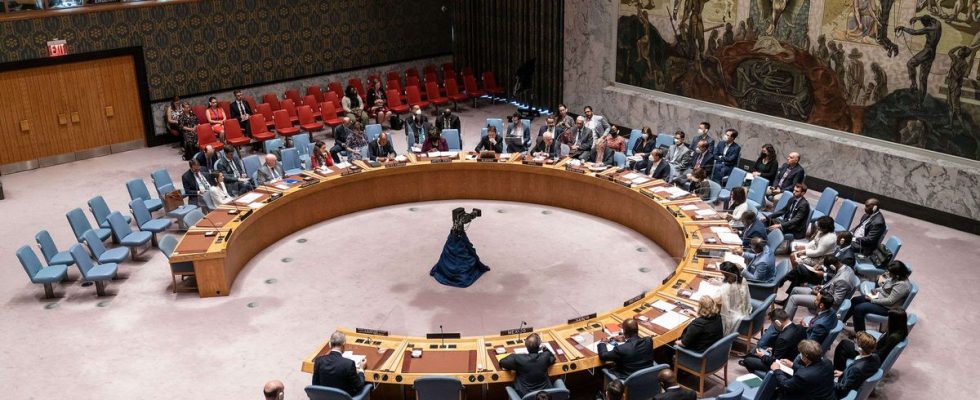Since the start of the Hamas-Israel war, after the “Flood of Al-Aqsa” on Saturday October 7, international countries have met on several occasions to consider the continuation of the conflict. However, on the Middle East issue, the United Nations is struggling to find an agreement. Some defend the Jewish state, others say they are more pro-Palestinian. Some advocate above all a ceasefire and envisage the establishment of a two-state solution. But the discussions are not moving forward.
This Wednesday, the UN Security Council once again rejected a draft resolution on Gaza. This new failure follows several disagreements between member states, sometimes forced to abstain or vote against. On October 16, France, for example, voted against a Russian draft resolution calling for “an immediate ceasefire”… leaving some skeptical about the reasons for this decision.
On Facebook, a viral video broadcast by the Break News account accuses France of having above all protected its relationship with Israel. Although France voted against this resolution, the news cannot be summed up so simply. 20 minutes explains why through a few questions.
FAKE OFF
How does the UN Security Council work?
It is necessary to question this question before returning to the latest discussions. There are fifteen members on the United Nations Security Council. Everyone has their own voice. “The Security Council has primary jurisdiction to determine the existence of a threat to peace or an act of aggression. It invites the parties to a dispute to settle that dispute by peaceful means and recommends such methods of adjustment and terms of settlement as it deems appropriate. In certain cases, it may impose sanctions or even authorize the use of force to maintain or restore international peace and security. recalls the UN website.
The current fifteen members are made up of five permanent members (China, United States, Russia, France and United Kingdom) to which are added members elected for two years (currently Albania, Brazil, the United Arab Emirates, Ecuador, Gabon, Ghana, Japan, Malta, Mozambique and Switzerland). For a draft resolution to be adopted, at least nine members must vote in favor, without any veto from the five permanent members.
What happened during the vote on the Russian proposal?
As we explained previously, on October 16, a draft resolution was proposed by Russia. He called for a humanitarian ceasefire in the Gaza Strip, but also for the release of all hostages, access to aid and the evacuation of civilians. This draft resolution received five votes in favor (China, Gabon, Mozambique, Russia and United Arab Emirates) and four against (France, Japan, United Kingdom and United States), with six abstentions (Albania, Brazil, Ecuador, Ghana , Malta and Switzerland).
Here, it is not so much the proposals to improve the situation in Gaza that have raised eyebrows in dissident countries, but the lack of condemnation of the Hamas terrorist attack. “France voted against the Russian project because several essential elements were missing”, justified on the social network X Nicolas de Rivière, ambassador and permanent representative of France to the United Nations. On the United Nations website, the ambassador calls for further condemnation of the Hamas terrorist attack against Israel, while regulating humanitarian aid and protecting the civilian population of Gaza.
Other dissident countries have been much firmer. “Hamas must be held accountable for its actions. He does not represent the Palestinian people and he has done nothing to promote peace and stability, preferring chaos,” said United States Representative Linda Thomas-Greenfield, reaffirming in a post “the inherent right to legitimate defense” of Israel. A similar request was also made by the United Kingdom.
Were there other proposals subsequently?
Yes, but they all ended in failure. Two days later, on October 18, a text proposed by Brazil achieved greater consensus with 12 votes in favor, but was abandoned in the face of a veto from the United States. The text this time called for “humanitarian pauses aimed at allowing full, rapid, safe and unhindered access to United Nations humanitarian agencies” in Gaza, while condemning “acts of violence and hostility directed against civilians as well as all acts of terrorism. But the United States felt that the resolution did not mention enough of Israel’s right to defend itself.
In a press release, France said it regretted the failure of the draft resolution. “The draft resolution also recalled the perspective of the two States, living side by side within secure and recognized borders and underlined the importance of increasing efforts in order to prevent an escalation in the Near and Middle East”, he was also recalled before adding that France remained mobilized to “respond to the humanitarian emergency”.
And since ?
Always nothing. This Wednesday, the UN Security Council again debated two draft resolutions proposed by one by the United States, the other by Russia. The first called for “an expansion of humanitarian aid” in Gaza. The second again called for an immediate “humanitarian ceasefire” and condemned the “abominable attacks by Hamas”. Both were rejected. On the French side, the country voted for the first and abstained from the second.
More broadly, this dead end in which the UN Security Council finds itself reveals the numerous discords between Western countries, China and Russia.

